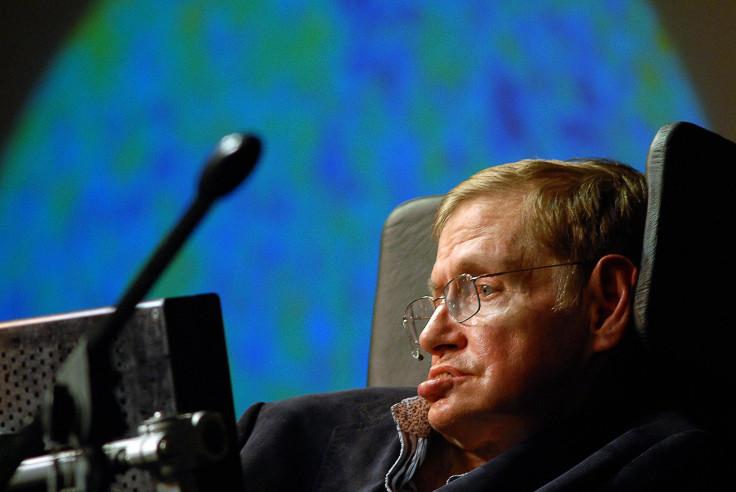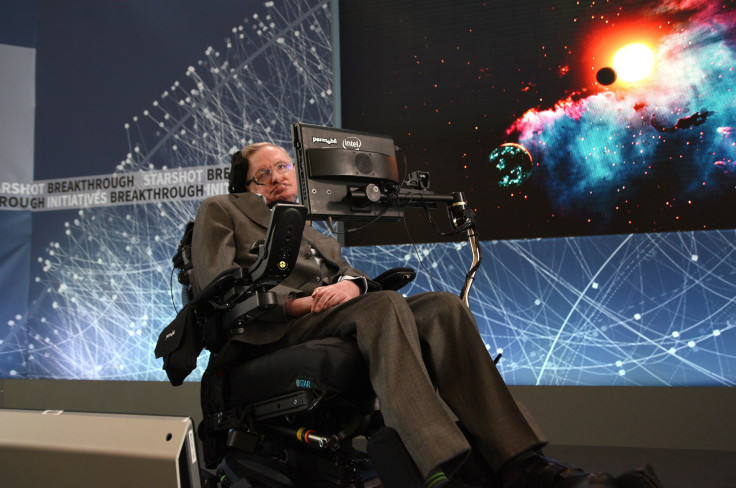Stephen Hawking’s Predictions About Artificial Intelligence, Aliens And The Future Of Humanity

Famed theoretical physicist Stephen Hawking announced his latest venture to unlock the secrets of the universe’s origins and find out more about black holes this week. Utilizing a supercomputer, Hawking’s Centre for Theoretical Cosmology (COSMOS) aimed to search for details about the Big Bang, the facility said.
Hawking is no stranger to humankind’s deep questions. The physicist is known for his groundbreaking strides in physics and cosmology and has often leveled predictions about the fate of humanity throughout his storied life. Hawking’s prophesies over the years have dealt with the effects of global warming on earth, the implications of artificial intelligence, and what humans should do if they ever make alien contact.
Here are some of Hawking’s most notable predictions about life on Earth and in space.
Robots and Humanity
Hawking warned earlier in November about the possibility of robots making humans obsolete. Hawking said he believed robots had the potential to become efficient enough to “outperform humans” and effectively take over.
“I fear that AI may replace humans altogether,” he told Wired. “If people design computer viruses, someone will design AI that improves and replicates itself. This will be a new form of life that outperforms humans.
Hothouse Earth
Following President Donald Trump’s decision to pull the United States out of the international deal on climate change, Hawking predicted the Earth would turn into a greenhouse-like planet.
“We are close to the tipping point where global warming becomes irreversible,” he told BBC News. “Trump’s action could push the Earth over the brink, to become like Venus, with a temperature of 250 degrees and raining sulphuric acid.”
Meeting the Aliens
Hawking has warned about the potentially catastrophic implications of contacting extraterrestrial life. In a television segment titled “Stephen Hawking’s Favorite Places,” Hawking discussed the possibilities of finding life on the potentially habitable planet Gliese 832c, some 16 light years away from Earth. Should humans make contact, Hawking warned, it might not be all that pleasant.
“If intelligent life has evolved, we should be able to hear it,” he said. “One day we might receive a signal from a planet like this, but we should be wary of answering back. Meeting an advanced civilization could be like the Native Americans encountering Columbus. That didn’t turn out so well.”
Moving to Mars
Hawking has been vocal in his belief that if humans are to survive, they must colonize other planets. A space colony needs to be thriving if humanity is to endure, he said. Appearing via Skype at this year's Starmus Festival, Hawking said humans should explore Mars or other locations in space within the next 100 years.
Technology Will Destroy Earth
Human nature combined with ever-advancing technological capabilities could mean the end of Earth, Hawking predicted.
“Since civilization began, aggression has been useful inasmuch as it has definite survival advantages,” Hawking told British news outlet The Times in March. “It is hard-wired into our genes by Darwinian evolution. Now, however, technology has advanced at such a pace that this aggression may destroy us all by nuclear or biological war.”
Hawking did, however, say the instinct could be combated with “logic and reason” and said he believed the human race will rise to meet the challenges.
Light Beams and Planet Colonization
Hawking has called for the use of light beams as a means for humanity to make its way to far off planets. At a June science and art convention in Norway, Hawking pointed out the planet Proxima Centauri b, four and a half light years – or 26 trillion miles – away from Earth. By using light beams, Hawking said, humans could potentially travel to distant celestial bodies.
“To go faster would require a much higher exhaust speed that chemical rockets can provide – that of light itself,” he said. “A powerful beam of light from the rear could drive the spaceship forward.”
The Next 1,000 Years
Hawking said humankind had less than 1,000 years left on planet Earth before a mass extinction takes place. In a November 2016 speech at Oxford University, Hawking said the only way to avoid annihilation by way of extinction was to find another planet.
“We must continue to go into space for the future of humanity,” he said. “I don’t think we will survive another 1,000 without escaping beyond our fragile planet.”

© Copyright IBTimes 2024. All rights reserved.




















